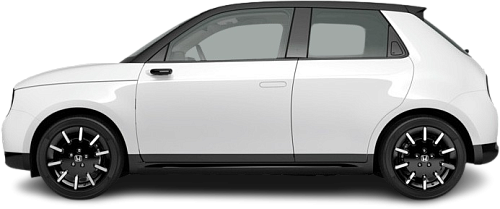USA EV Comparison: Honda e Advance vs Volvo C40 Recharge (EC40) Pure Electric
Struggling to Decide? Let AI Help!
Your AI Summary Is Ready!
General Info
Both vehicles have been discontinued and were never available for sale in the United States.
The Honda e Advance (2020-2023) is a Hatchback, whereas the Volvo C40 Recharge (EC40) Pure Electric (2021-2022) is a SUV.
| Property | Honda e Advance | Volvo C40 Recharge (EC40) Pure Electric |
|---|---|---|
| Years of Production | 2020-2023 | 2021-2022 |
| Current Status | Discontinued | Discontinued |
| Country of Manufacture | Japan | Belgium |
| Body Style | Hatchback | SUV |
| Market Availability | EU | EU |
| GCC Score | 4.7 | 6.1 |
Range and Efficiency
While the Volvo C40 Recharge (EC40) Pure Electric (2021-2022) offers a longer real-world range and a bigger battery, it is less energy-efficient than the Honda e Advance (2020-2023).
| Property | Honda e Advance | Volvo C40 Recharge (EC40) Pure Electric |
|---|---|---|
| Range (WLTP) | 138 mi | 272 mi |
| Range (GCC) | 117 mi | 232 mi |
| Battery Capacity (Nominal) | 35.5 kWh | 69 kWh |
| Battery Capacity (Usable) | 28.5 kWh | 67 kWh |
| Efficiency per 100 mi | 24.4 kWh/100 mi | 28.9 kWh/100 mi |
| Efficiency per kWh | 4.11 mi/kWh | 3.46 mi/kWh |
| Range and Efficiency Score | 5.7 | 6.4 |
Charging
Both vehicles utilize a standard 400-volt architecture.
The Volvo C40 Recharge (EC40) Pure Electric (2021-2022) offers faster charging speeds at DC stations, reaching up to 150 kW, while the Honda e Advance (2020-2023) maxes out at 46 kW.
The Volvo C40 Recharge (EC40) Pure Electric (2021-2022) features a more powerful on-board charger, supporting a maximum AC charging power of 11 kW, whereas the Honda e Advance (2020-2023) is limited to 6.6 kW.
| Property | Honda e Advance | Volvo C40 Recharge (EC40) Pure Electric |
|---|---|---|
| Max Charging Power (AC) | 6.6 kW | 11 kW |
| Max Charging Power (DC) | 46 kW | 150 kW |
| Architecture | 400 V | 400 V |
| Charge Port | CCS Type 2 | CCS Type 2 |
| Charging Score | 3.5 | 6.2 |
Performance
The Honda e Advance (2020-2023) is rear-wheel drive, while the Volvo C40 Recharge (EC40) Pure Electric (2021-2022) offers a front-wheel drive system.
The Volvo C40 Recharge (EC40) Pure Electric (2021-2022) boasts greater motor power and accelerates faster from 0 to 60 mph.
| Property | Honda e Advance | Volvo C40 Recharge (EC40) Pure Electric |
|---|---|---|
| Drive Type | RWD | FWD |
| Motor Type | PMSM | PMSM |
| Motor Power (kW) | 113 kW | 170 kW |
| Motor Power (hp) | 152 hp | 228 hp |
| Motor Torque | 232 lb-ft | 243 lb-ft |
| 0-60 mph | 8 s | 7.1 s |
| Top Speed | 90 mph | 99 mph |
| Performance Score | 3 | 3.6 |
Dimensions
The Volvo C40 Recharge (EC40) Pure Electric (2021-2022) is longer, wider, and taller.
The Volvo C40 Recharge (EC40) Pure Electric (2021-2022) boasts a more extended wheelbase.
| Property | Honda e Advance | Volvo C40 Recharge (EC40) Pure Electric |
|---|---|---|
| Length | 153.3 in | 174.8 in |
| Width (with Mirrors) | - Width (with Mirrors) | 80.1 in |
| Width (w/o Mirrors) | 69 in | 73.7 in |
| Height | 59.5 in | 62.8 in |
| Wheelbase | 99.9 in | 106.4 in |
Cargo and Towing
The Volvo C40 Recharge (EC40) Pure Electric (2021-2022) provides more cargo capacity, featuring both a larger trunk and more space with the rear seats folded.
A frunk (front trunk) is available in the Volvo C40 Recharge (EC40) Pure Electric (2021-2022), but the Honda e Advance (2020-2023) doesn’t have one.
The Volvo C40 Recharge (EC40) Pure Electric (2021-2022) has a towing capacity of up to 2000 lb, whereas the Honda e Advance (2020-2023) is not officially rated for towing in the US.
| Property | Honda e Advance | Volvo C40 Recharge (EC40) Pure Electric |
|---|---|---|
| Number of Seats | 4 | 5 |
| Curb Weight | 3516 lb | 4343 lb |
| Cargo Volume (Trunk) | 6 ft3 | 15 ft3 |
| Cargo Volume (Max) | 30.4 ft3 | 49 ft3 |
| Cargo Volume (Frunk) | - Cargo Volume (Frunk) | 1.1 ft3 |
| Towing Capacity | - Towing Capacity | 2000 lb |
| Cargo and Towing Score | 3.8 | 6.4 |




